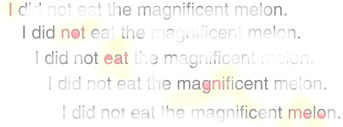

 |
Greg Kochanski |  |
Linguistics is a slow field, why? Some people might disagree, pointing to extensive bibliographies in Syntax and Optimality Theory, but they would mostly be wrong because of their insider's perspective. But, viewed from the outside, it is slow at generating results that affect other disciplines or that lead to practical applications. Its progress, viewed from the inside, seems more rapid because insiders have an emotional stake in its success and because they can see smaller successes that outsiders miss.
Other fields have external impacts, often both on other academic fields and in practical applications. For instance, Chemistry gives one the ability to make plastics, and the world we live in is seems to be mostly made of plastic. Chemistry also regularly interacts with Biology and Medicine and Physics: these days, new drugs often come from a process of simulating the chemistry of a disease process, then looking for a chemical that will react with a critical molecule and interfere with the process.
Linguistics has had modest practical effect on three fields where it ought to dominate: Applied Linguistics (i.e. Language Teaching), Internet Search Engines, and Spam Filters. It has effects on other disciplines, notably Philosophy, Psycholinguistics, and Cogntive Science, but one gets the feeling that Psycholinguistics and Cognitive Science are more a case of other people attempting to understand language, rather than Linguists applying their knowledge to other domains.
It's easy to say that Linguistics is a hard field, and it's true. In it, one studies sophisticated behaviours (i.e. language) of complicated organisms (i.e. people). One wouldn't expect the answers to be simple.
Also, many of the questions that Linguistics would like to answer are philosophically different from the kind of questions that science knows how to answer. We'd like to know what things mean, not just how they behave. It's a field that's about thought as much as it is about speech, and thought is not easy to observe and quantify. To a large extent, we don't know what questions to ask.
So, perhaps rapid progress is not to be expected. But, that's not a complete explanation: Biologists, Ecologists and Computer Scientists deal with complex systems. The philosophical difficulties are real, but they are not everywhere in the field. Some things can be studied without much need to consider their meaning, and some things have well-established meanings that can be taken as a given. So, it is fair to ask "Why is Linguistics slow?"
Decades ago, John Platt wrote an article in Science that seems relevant. He wrote it as a keynote address at a chemistry conference, apparently pointing out that the chemists were not keeping up with the biologists. It's not a formal comparison with extensive references but it makes a strong case for his idea.
Platt likens the process of science to walking a tree. At each step, you have a set of choices -- these are alternative hypotheses. You design an experiment to choose among the immediate possibilities, step to the next choice and repeat. The distinction between fast and slow fields, he says, is cultural.
To walk the tree effectively and rapidly, you need to think about what the important questions are and come up with testable hypotheses that embody these questions. Then, you need to design experiments that will conclusively reject at least some of these hypotheses, and the relevant word is "conclusively." The experiments have to be done on a sufficient scale and with sufficient care to give a solid answer. Then rethink and repeat.
Philosophically, this is basically an elaboration of Popper's observation (K. R. Popper, The logic of scientific discovery Basic Books, also Routledge Classics, ISBN-10: 0415278449 ISBN-13: 978-0415278447). However, Platt is talking more about the sociology of science than the philosophy. Platt points out that if there isn't a culture of searching for the most important questions (among those that we currently can hope to answer) then the odds are that unimportant questions will be asked. After all, there are a lot more unimportant questions than important questions.
Platt also points out that you need to divorce hypotheses from scientists. If everyone has their own personal theory, then human nature will say that people will be reluctant to test their own theory, and if someone else tests it, we will be reluctant to let go if it. This slows down the process, dramatically perhaps. In a field where important people have personal theories, those theories won't die until their owners do. Progress, then becomes a thing bequeathed to one's children.
Linguistics suffers from all these problems. Experimental approaches are not common, important people own important theories, and there is a general culture of live and let-live. People don't worry if an experiment doesn't support their theory, and rarely drop the theory. Of course, many experiments haven't been conclusive, or haven't been carefully designed to disprove a theory, so often the theorists are right not to take them too seriously.
Platt points out two "Aids to Strong Inference" which I have strongly believed in for years, even though I've not always been in a position where I could reasonably ask them:
In my experience, people who are smart and who really want to know what is going on will answer these questions. Or, at least they'll admit that they don't have an answer yet: Linguistics is a hard field and we don't always know what research questions to ask. These questions should be asked, though. Sometimes quietly, sometimes loudly, but they need to be part of the field's culture.
Platt's paper is John R. Platt, "Strong Inference" (1964) Science 146(3642), pages 347-353, doi:10.1126/science.146.3642.347 . It can be found on the web at [ 1 , 2 , 3 ]
| [ Papers | kochanski.org | Phonetics Lab | Oxford ] | Last Modified Sun Aug 3 09:10:05 2008 | Greg Kochanski: [ Home ] |